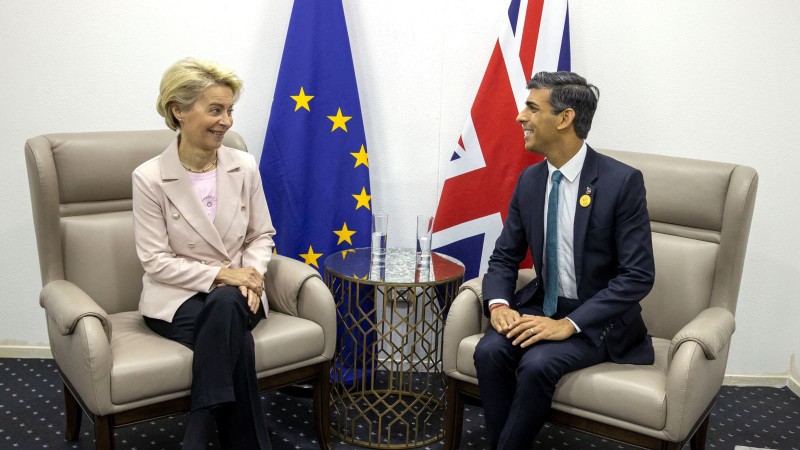
The crucial Brexit deal for Northern Ireland between Britain and the EU is getting closer
- Business
- February 27, 2023
On Monday, European Commission President Ursula von der Leyen and British Prime Minister Rishi Sunak will meet in the United Kingdom to finalize a deal to resolve the Northern Ireland Protocol, a key sticking point in the post-Brexit trading arrangement.
“Agreed to continue their work in person towards shared, practical solutions for the range of complex challenges around the Protocol on Ireland and Northern Ireland,” Sunak and von der Leyen said in a joint statement on Sunday.
Although the United Kingdom left the European Union on January 31, 2020, disagreement over the Northern Ireland Protocol has persisted ever since. The new negotiations are aimed at easing these rules, which are mandated by this section of the Brexit deal and apply to some goods that travel from the rest of the UK to Northern Ireland.
Unionist parties in Northern Ireland, which is a part of the United Kingdom but is not a member of the European Union like its neighbor Ireland, have argued that the checks make an actual border in the Irish Sea. The Good Friday Agreement, a long-standing peace agreement that ended three decades of sectarian violence in Northern Ireland, has also been criticized for being put in jeopardy by the Protocol.
The hardline Eurosceptic wing of the ruling Conservative Party has led calls to rip up the deal negotiated by Sunak’s government, which has sought amendments to the agreement signed by former Prime Minister Boris Johnson.
Sunak, in contrast to his predecessors Johnson and Liz Truss, has adopted a less combative approach to engagement with the EU in the hope of easing checks on goods crossing the Irish Sea in order to resolve key issues pertaining to Northern Ireland.
He must, however, persuade his own party to vote for any potential deal in parliament.
In the meantime, the Democratic Unionist Party resigned in protest of the Northern Ireland Protocol in February 2022, which resulted in the suspension of the devolved Northern Ireland Assembly. Over the weekend, the loyalist party issued new warnings that it would not be coerced into accepting a deal that did not adhere to its “red lines.”
Since the Brexit vote, business investment in the UK has decreased, and the political climate of the country has been turbulent for the past few years as successive Conservative prime ministers have struggled with the challenges of a smooth EU exit.
According to Raoul Ruparel, director of the Centre for Growth at the Boston Consulting Group, who spoke with CNBC on Monday, the business community will welcome the deal as long as it satisfies unionist parties in Northern Ireland. Uncertainty was cited by approximately half of business leaders in a recent BCG survey as the primary reason for the country’s current lack of business investment.
“So clearly this is part of the political uncertainty that we’ve seen, we have this Northern Ireland Protocol Bill which would rip up the protocol if a deal isn’t found, and I think a lot of businesses are looking at that and thinking that could lead to a trade dispute with the EU,” he said.
“I think all of this really will try and take this issue off the table, remove that uncertainty and be another factor in at least allowing businesses to focus on their day-to-day, rather than worrying about all of these developments.”
He did, however, suggest that while a deal might soften the tense relationship between Westminster and Brussels, it might take some time for actual changes to occur.
“I think there are limited things you can do to improve the deal, particularly with the current government and the Conservative approach, so yes there will be a better atmosphere and it will remove some uncertainty, but I’m not sure we’ll see that translating to concrete changes to the deal yet,” he added.